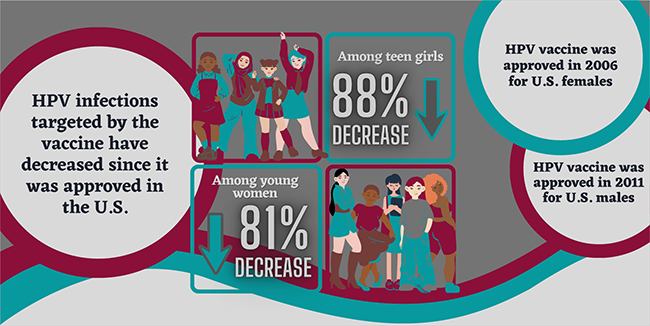HPV Vaccination Is Cancer Prevention

Human Papillomavirus (HPV)
HPV is a common virus that can cause six types of cancer. Vaccination can prevent up to 90% of these cancers.
This cancer prevention vaccine is safe, effective, and has been FDA-approved since 2006. The HPV vaccine is so safe and effective, Scotland recently reported no cervical cancer diagnoses in women who were fully vaccinated “on time” (by age 13). Australia’s goal is to be the first country to eliminate cervical cancer by 2035; they are vaccinating boys and girls.
In America, oropharyngeal (base of the tongue and middle part of the throat) cancer is on the rise. Between 2015–2019, oropharyngeal cancer rates increased in American men at three times the rate of American women.
We Can Eliminate HPV-Related Cancers
The Knight Cancer Institute, in collaboration with the University of Oregon, created an online educational module about cancer prevention from HPV-related cancers. The module aims to empower teenagers, parents/guardians, and those who work with community members, for instance, Community Health Workers. Information shared may help inform individual-level choices about preventing HPV infection. Continuing education (CE) credits pending. Click here to visit the module.

Reducing the Burden of Oropharyngeal Cancer in Oregon
Each year, the Community Cancer Control Specialists will lead a coordinated effort to promote cancer prevention and early detection for a cancer type that has a disproportionate impact in Oregon. The focus in 2024 is on oropharyngeal cancer, as cases are increasing across the state:
- While cervical cancer rates are decreasing due to a high vaccination rate in girls/young women (we see an average of 145 cases a year), oropharyngeal cancer rates in Oregon are rising to an average of 656 cases a year.
- New cases of oropharyngeal cancer in Oregon are higher than the national average. Oregonian men account for more new cases (470) than women (186).
Effective prevention strategies for oropharyngeal cancer include HPV vaccination (70% of oropharyngeal cancers are HPV-related) and substance use prevention or cessation. Community Cancer Control Specialists, in collaboration with the OHSU School of Dentistry and Boost Oregon, are providing training, continuing education, and technical assistance to dental providers, community health workers, and local public health agencies/community-based organizations on strategies to address oropharyngeal cancer. These include HPV vaccination as cancer prevention, tobacco and betel quid cessation programming, and recognizing and addressing symptoms of oropharyngeal cancers.
Contact
For general inquiries, email us at knightcommunity@ohsu.edu
CORE
The Knight Community Outreach and Engagement team is just one branch of the broader Community Outreach, Research and Engagement (CORE) at OHSU.